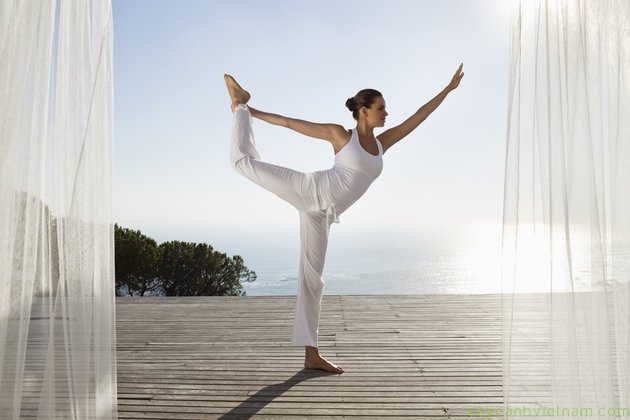Whether it’s smoking, drinking or eating unhealthy foods, we all have bad habits we struggle to work through. There are many ways to attempt to eliminate such tendencies, but most of them don’t work. We can try to painstakingly hack away at the problem or deprive ourselves, but old behaviors are relentless – and they often come back to haunt us. To tackle those unhealthy habits for good, try a more holistic approach: yoga. Here’s why it works:
1. It cultivates self-awareness.
Most bad habits are so deeply rooted that they become your default response. When you go to reach for that candy bar or cigarette, for instance, you don’t think about it, you simply react to your craving. You need to force yourself to slow down and notice your compulsive behavior – that’s the first step to eliminating it. And, that’s where yoga comes in.

Perhaps the greatest teaching in yoga is to pause and make thoughtful decisions instead of mindlessly going with your knee-jerk reaction. When you practice, you deepen your breath and sync your movements with it. To do that, you must pay attention to how you are feeling and how your decisions affect your body and attitude. Your connection to your breath tells you if you are pushing too far or moving too quickly. You want to maintain full, deep inhalations and exhalations throughout your practice. When you’re gasping for air, you’re no longer in control. In that case, you need to stop until you can reestablish control over your breath and maintain a calm state of mind. Eventually, you’ll be skilled at stopping yourself to process your thoughts before you act – both on and off the mat.
2. It requires commitment.
If you have tried to deprive yourself of something you enjoy, like carbohydrate-rich foods, you know you will most likely give in and cheat once in a while. This happens to all of us, and it’s OK as long as it doesn’t happen consistently. What matters is that you are making progress and you stick with your plan.
When you practice yoga, the poses challenge you to balance – sometimes on one leg. You are going to fall repeatedly. But more important than accomplishing the pose is the commitment to getting back in it and trying again. This cycle of attempting a pose, falling and then recommitting to it teaches you not to get discouraged and to stay with it until you reach your goal. Consistent effort over a long period of time adds up to incredible progress in all areas of your life.
3. It gives you perspective.
In a culture obsessed with instant gratification, yoga gives you a broader outlook on what you really want for sustained happiness. There is an underlying philosophy in yoga that helps you become honest with yourself. This attitude helps you realize there is something greater you are working toward, and to savor every step of the way. It demands that you look beyond physical accomplishments and recognize that anything worth doing takes time.
In yoga poses, you strive to advance toward more challenging variations. As a beginner, you are given clear, physical landmarks to know when you are ready to move onto the next stage of the pose safely. Yoga provides a light-hearted and playful atmosphere while working toward a goal pose.
Take the time to acknowledge your progress and don’t be too tough on yourself. When you recognize what you are capable of, it motivates you to advance. This feeling empowers you to make strides toward meaningful changes off the mat.
4. It provides a supportive and healthy community.
Nothing is more disheartening than finally taking the first steps to change your bad habits – only to be discouraged by your peers. Yoga brings together like-minded people who willingly choose to do something healthy for themselves every time they step on their mats. If you surround yourself with supportive people who are positive and want you to succeed, you feel stronger and more capable to take on obstacles. Knowing there is a whole community you don’t want to let down also encourages you to keep moving forward.
5. It holds you accountable to your goals.
While most of the time we practice in groups, yoga is a very personal experience. You are asked to be honest with yourself and notice your alignment in poses before advancing. It demands that you check in and never push into pain just to keep up with those around you. This outlook takes some time to cultivate and is humbling, but it’s crucial to hold yourself accountable to your body and ego. After a couple weeks, you will start to notice that this attitude translates to your life off the mat, and you’ll become more sensitive to what you say and do. You’ll develop a new appreciation for yourself and the effect you have on others.
6. It offers role models and coaches.
Everyone needs a teacher or a coach who has faced similar obstacles and can guide you along your path. Seek out teachers whose classes you enjoy the most and with whom you connect. Most teachers love to answer questions. If you feel stuck on a certain pose or otherwise, ask the teacher before or after class for advice. Remember: Your teachers are people, too. They might not have all the answers for you, but they are great resources to help you move past any difficulties that arise. This relationship is invaluable and the right teacher could evolve your yoga practice into a complete wellness lifestyle.
I upvoted You
I wil try it!
yoga is good!